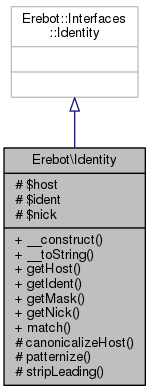Represents the identity of an IRC user. More...
 Inheritance diagram for Erebot\Identity:
Inheritance diagram for Erebot\Identity:Public Member Functions | |
| __construct ($user) | |
| __toString () | |
| getHost ($c10n) | |
| getIdent () | |
| getMask ($c10n) | |
| getNick () | |
| match ($pattern,\Erebot\Interfaces\IrcCollator $collator) | |
Static Protected Member Functions | |
| static | canonicalizeHost ($host, $c10n, $uncompressed) |
| static | patternize ($pattern, $matchDot) |
| static | stripLeading (&$number, $key) |
Protected Attributes | |
| $host | |
| Host part for this user identity, either a string or null. | |
| $ident | |
| Identity string for this user identity, either a string or null. | |
| $nick | |
| Nickname for this user identity, either a string or null. | |
Detailed Description
Represents the identity of an IRC user.
Definition at line 27 of file Identity.php.
Constructor & Destructor Documentation
| Erebot\Identity::__construct | ( | $user | ) |
Creates a new object holding some user's identity.
- Parameters
-
string $user A string, representing some user. This can be either a mask, such as "foo!ident@host" or just a nickname, such as "foo".
- Exceptions
-
Erebot::InvalidValueException The given $user does not represent a valid identity.
Definition at line 49 of file Identity.php.
Member Function Documentation
|
staticprotected |
Canonicalizes a host.
Despite its name, this method may be applied to either a hostname or an IP address (v4 or v6).
- Parameters
-
string $host Hostname or IP address to canonicalize. opaque $c10n The type of canonicalization to apply. This is either Erebot::Interfaces::Identity::CANON_IPV4 or Erebot::Interfaces::Identity::CANON_IPV6 depending on whether IPv6-mapped-IPv4 addresses should be rendered in dotted form or in the regular IPv6 form, respectively. bool $uncompressed Whether to compress IP addresses or not. In compressed form, leading zeros in a colon group are omitted and a series of groups with all-zeros is represented with just "::".
- Return values
-
string The original hostname or IP address in canonicalized (and optionally compressed) form.
- Note
- The only transformation that is applied to hostnames as part of this canonicalization method is one that lowercases them.
- See Also
- See the various RFCs related to IP addresses for an exact description of the transformations that apply when compressing an IPv6 address.
Definition at line 165 of file Identity.php.
| Erebot\Identity::match | ( | $pattern, | |
| \Erebot\Interfaces\IrcCollator | $collator | ||
| ) |
Indicates whether this identity matches a given pattern.
- Parameters
-
string $pattern The pattern this identity should be tested against. The '?' and '*' wildcard characters are supported. Erebot::Interfaces::IrcCollator $collator Collator object to use to compare IRC nicknames.
- Return values
-
bool true if this identity matches the given pattern, false otherwise.
Definition at line 326 of file Identity.php.
|
staticprotected |
Turn a basic pattern (optionally) containing wirldcards into a regular expression pattern, intended to match hostnames or IP addresses.
- Parameters
-
string $pattern Basic pattern, possibly containing wildcard characters ('*' and '?'). bool $matchDot Whether the '?' and '*' wildcard characters should also match dots '.' (true) or not (false).
- Return values
-
string A regular expression pattern that matches the criteria expressed in the original pattern.
Definition at line 457 of file Identity.php.
|
staticprotected |
Strips leading '0' in front of a numeric string.
- Parameters
-
string $number Numeric string whose leading '0' should be stripped. Passed by reference and modified in-place. opaque $key Unused.
- Returns
- Nothing ($number is modified in-place).
- Note
- This method is meant to be used with the array_walk() PHP function.
Definition at line 122 of file Identity.php.
The documentation for this class was generated from the following file:
- src/Identity.php

